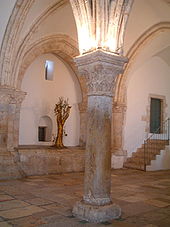Lectionary Text: John 20: 19-31
When it was evening on that day, the first day of the week, and the doors of the house where the disciples had met were locked for fear of the Jews, Jesus came and stood among them and said, “Peace be with you.” After he said this, he showed them his hands and his side. Then the disciples rejoiced when they saw the Lord. Jesus said to them again, “Peace be with you. As the Father has sent me, so I send you.” When he had said this, he breathed on them and said to them, “Receive the Holy Spirit. If you forgive the sins of any, they are forgiven them; if you retain the sins of any, they are retained.” But Thomas (who was called the Twin), one of the twelve, was not with them when Jesus came. So the other disciples told him, “We have seen the Lord.” But he said to them, “Unless I see the mark of the nails in his hands, and put my finger in the mark of the nails and my hand in his side, I will not believe.” A week later his disciples were again in the house, and Thomas was with them. Although the doors were shut, Jesus came and stood among them and said, “Peace be with you.” Then he said to Thomas, “Put your finger here and see my hands. Reach out your hand and put it in my side. Do not doubt but believe.” Thomas answered him, “My Lord and my God!” Jesus said to him, “Have you believed because you have seen me? Blessed are those who have not seen and yet have come to believe.” Now Jesus did many other signs in the presence of his disciples, which are not written in this book. But these are written so that you may come to believe that Jesus is the Messiah, the Son of God, and that through believing you may have life in his name.
This Scripture probably scares all of us a bit. Are we just supposed to believe unconditionally, take on a sort of blind faith without questioning, without trying to figure it all out? I don’t really believe that (but maybe I have my doubts!). No, really, the Scriptues tell us to believe but nowhere does it say that we’re not supposed to explore that belief. The truth is, we fault Thomas here and, yet, the others HAD seen. Of course they believed. Thomas, though, alone, had the courage and, I would say, the faith, to question it all. And Jesus gave him the gift of himself, the gift not of answers but of illumination. Thomas probably still couldn’t explain to you how or why or even if it happened. He just believed that it did.
Swiss-born theologian and writer Hans Kung said that “doubt is the shadow cast by faith. One does not always notice it, but it is always there, though concealed. At any moment it may come into action. There is no mystery of the faith which is immune to doubt.” Isn’t that a wonderful thought? Doubt is the shadow cast by faith. Faith in the resurrection does not exclude doubt, but takes doubt into itself. Faith is a matter of worshipping and doubting, doubting and worshipping. It is a matter of being part of this wonderful community of disciples not because God told us to but because our doubts bring us together. Examining our faith involves doubts, it requires us to learn the questions to ask. And it is in the face of doubt that our faith is born. God does not call us to a blind, unexamined faith, accepting all that we see and all that we hear as unquestionable truth; God instead calls us to an illumined doubt, through which we search and journey toward a greater understanding of God.
At the risk of disappointing some of you, going to seminary did not give me all the answers to the faith. It taught me how to ask the questions. I think that’s what faith is about–not having the right answers all the time but having the courage and indeed the desire to continue asking those questions that lead us to a more illumined faith. Who is God? What is God to you? Who is Christ? What does it mean to be Christ in this world? What does it truly mean to show your brothers and sisters in this world what the Risen Christ means to you? The list is endless, far into the shadows up ahead. Faith is not about memorizing doctrines or dismissing questions in light of what some choose to call “orthodox” belief. And I don’t think we’re called to have the answers but rather to live a faith that becomes alive and illumined by our questions and our exploration and our continued search for what it all means in our life. That is the way we connect with God. That is the way we journey toward God. That is the way to living a life of faith that is propelled by our doubts rather than pulled down by them. Maybe our doubts are not supposed to live in the shadows of our lives but way out in front, pulling us into a greater understanding of this God that we so desire. Maybe a life of faith IS lived in the shadow of a doubt. Hey, remember what creates shadows? Light… Isn’t that illuminating?
So in this season in which you see the Risen Christ, go ahead and doubt and then let it lead to faith, to the belief that it is so.
Grace and Peace,
Shelli







